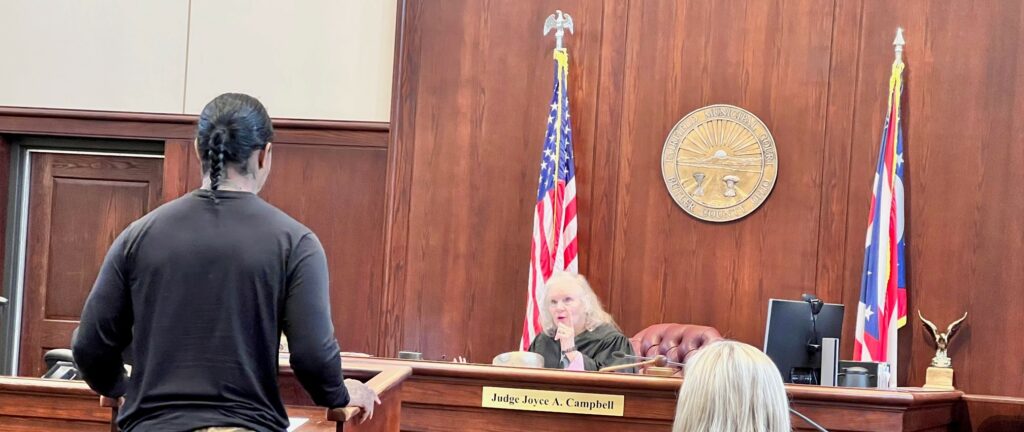Written by: Alan Johnson, NAMI Ohio
FAIRFIELD, OH – Judge Joyce A. Campbell’s Fairfield Municipal Courtroom looks like any other: a judge in a black robe, a jury box, witness stand, tables for attorneys, and armed law enforcement.
But when the gavel comes down in the Fairfield Municipal Court Treatment Alternative Court (TAC) you see things are very different in this courtroom.
TAC is a special court where Judge Campbell deals with misdemeanor offenders who have been diagnosed with a serious mental illness. While TAC is voluntary, those sent to Judge Campbell’s court are there in hopes of avoiding jail on misdemeanor charges whenever possible. Instead, they receive alternative sentences – mental health and physical health treatment, access to drug and alcohol programs, and case management to help with employment, education, housing, and transportation.
Ohio has 40 mental health courts, which are among a total of more than 249 specialty courts for drunk driving, drug abuse, human trafficking, veterans, and other offenses.
Judge Campbell, who is national president of the National Alliance on Mental Illness and a NAMI Ohio Board member, is a leading advocate of helping people with mental health issues avoid being trapped in a court system where they often end up behind bars where their mental illness remains untreated and sometimes worsens.
“This is where my heart is. People with mental illness have been treated very poorly by the criminal justice system,” Judge Campbell said after a recent 90-minute TAC session where she handled 16 cases. Most people remain under court supervision for one to two years.
Judge Campbell deals on a first-name basis with everyone who appears before her. She alternates between being complimentary and supportive of those who have made positive efforts, and sharply critical while warning offenders who have run off track that jail time is a real possibility.
“I’m not asking you. I’m telling you,” she said to one young man who failed several mandatory drug tests. “The alternative is jail, and I don’t want to do that.”
Now and then, Judge Campbell finds no alternative. A woman she previously sentenced to jail for violating her probation appeared in court in shackles dressed in a Butler County Jail uniform. She told the judge, “I’m going to remain sober. I’m done now.” She said she spent her 33rd birthday in jail without a celebration or a birthday cake.
“Do not do anything. They’re going to drug test you,” Judge Campbell said after agreeing to release the woman the next day. She sweetened the deal by promising her “a real cake” if she stayed clean and sober until her next court date in July. “Do you want chocolate or vanilla?” the judge asked. She wanted vanilla. “We’ll have cake,” Judge Campbell said.
In another case, she excused herself from the bench in the middle of talking to a man who said he mediated to calm himself to avoid repeating past mistakes. She returned a few minutes later from her office with a Tibetan singing bowl, a brass bowl that makes soothing sound vibrations when struck with a wooden mallet. She demonstrated and told the man, “Get yourself a singing bowl.”
No two cases in the Fairfield TAC are treated the same. Judge Campbell praised some but gave stern warnings to others who made repeated mistakes.
“Two steps forward and one step back. I don’t want to cha-cha with you. You’ve got to start thinking, young man,” she said. “Your actions have consequences.”
To another, she said, “You’ve got an incredibly bright future, I don’t want you to blow that up.”
A man who had missed a previous court appearance got a tongue-lashing. “These are not invitations from the court. These are orders from the court. They will come and take you to jail.”
Judge Campbell was amazed to learn one offender smoked marijuana the day before he appeared in her court.
“It interferes with your psychotropic medication,” she told him. “And I can’t tell you how many times I’ve had people in this court who thought they were smoking a little weed and it turned out it had fentanyl in it. Do you know what happens then? You end up dead.”
Most people who appear in Judge Campbell’s court are referred by police, prosecutors, or the public defender in hopes they can be rehabilitated without serving jail time. In most cases, they can also get their record expunged because a criminal record is a major handicap for former offenders seeking employment and housing.
The most common diagnoses of those in TAC are bipolar disorder, major depression, and schizophrenia. Some also have developmental disabilities and drug issues as well.
The judge partners with a team in her courtroom, including Max Bryant, a probation officer assigned to the court; Tina Barrett, an attorney from the public defender’s office; Amy Crouch and Brandi Justice, from TLC Transitional Living, an agency offering counseling, psychiatric service, and residential care, and Maxine Seelenbinder-Apke or other representatives from NAMI Butler County. A city prosecutor sometimes sits in as well.
TAC is not a get-out-of-jail-free card. Offenders must follow a lengthy, specific set of rules, including abstaining from drugs and alcohol, attending counseling appointments and drug tests as required, taking prescribed medications, paying court costs and fines, and avoiding further run-ins with the law. They pay a diversion fee and monthly charge for probation reporting.
While TAC is the most time-intensive of Judge Campbell’s assignments, she has many other unrelated civil and criminal cases – a total of about 10,000 per year.

